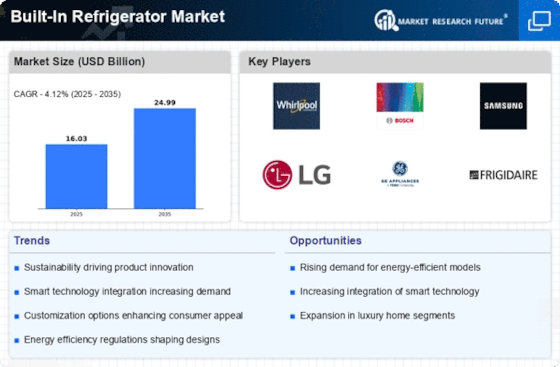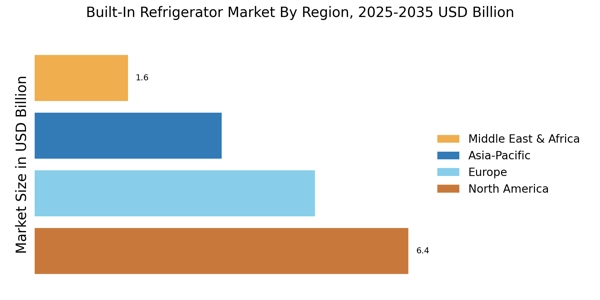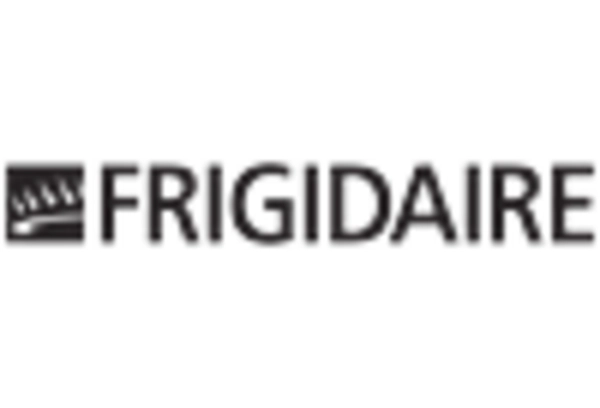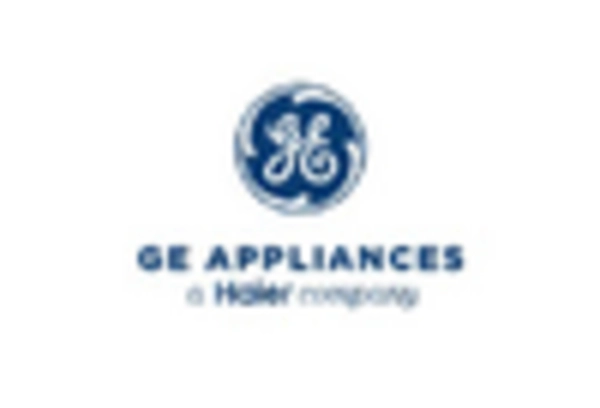Increasing Focus on Sustainability
Sustainability has emerged as a pivotal driver within the Built-In Refrigerator Market Industry, as consumers become more environmentally conscious. The demand for energy-efficient appliances is on the rise, with built-in refrigerators often featuring advanced technologies that reduce energy consumption. Many manufacturers are now prioritizing eco-friendly materials and production processes, aligning with the global push for sustainability. Data suggests that energy-efficient models can reduce energy usage by up to 30% compared to traditional refrigerators. This focus on sustainability not only appeals to environmentally aware consumers but also positions brands favorably in a competitive market. As regulations around energy efficiency tighten, the Built-In Refrigerator Market Industry is expected to adapt, further enhancing its appeal to a broader audience.
Growing Interest in Kitchen Renovations
The Built-In Refrigerator Market Industry is significantly influenced by the growing interest in kitchen renovations. Homeowners are increasingly investing in kitchen upgrades, seeking to enhance both functionality and aesthetics. Built-in refrigerators, which offer a streamlined look and can be customized to match cabinetry, are becoming a preferred choice in modern kitchen designs. Recent statistics indicate that the home renovation market is expected to reach a valuation of over 400 billion dollars in the coming years, with kitchen renovations accounting for a substantial portion of this growth. This trend suggests that as more consumers undertake kitchen remodels, the demand for built-in refrigerators will likely increase, further propelling the Built-In Refrigerator Market Industry.
Rising Demand for Space-Saving Solutions
The Built-In Refrigerator Market Industry experiences a notable surge in demand for space-saving solutions, particularly in urban environments where living spaces are often limited. Consumers increasingly seek appliances that maximize functionality without compromising on aesthetics. Built-in refrigerators, designed to seamlessly integrate into cabinetry, cater to this need by providing a sleek and unobtrusive appearance. According to recent data, the market for built-in appliances is projected to grow at a compound annual growth rate of approximately 5.5% over the next five years. This trend indicates a shift in consumer preferences towards integrated kitchen solutions that enhance both utility and design. As urbanization continues to rise, the Built-In Refrigerator Market Industry is likely to benefit from this growing inclination towards efficient space utilization.
Technological Advancements in Refrigeration
Technological advancements play a crucial role in shaping the Built-In Refrigerator Market Industry. Innovations such as smart technology integration, which allows users to control their appliances remotely, are becoming increasingly prevalent. Features like temperature control, humidity regulation, and inventory management through mobile applications enhance user convenience and efficiency. The market is witnessing a shift towards refrigerators equipped with advanced sensors and connectivity options, which not only improve functionality but also cater to the tech-savvy consumer. As these technologies continue to evolve, they are likely to drive growth in the Built-In Refrigerator Market Industry, appealing to a demographic that values both innovation and practicality.
Rising Disposable Income and Consumer Spending
Rising disposable income levels across various demographics are contributing to the growth of the Built-In Refrigerator Market Industry. As consumers experience increased financial flexibility, they are more inclined to invest in high-quality, premium appliances that offer enhanced features and aesthetics. Built-in refrigerators, often positioned as luxury items, appeal to affluent consumers looking to elevate their kitchen experience. Market analysis indicates that the luxury appliance segment is projected to grow at a rate of 6% annually, reflecting a broader trend of increased consumer spending on home improvements. This rise in disposable income is likely to bolster the Built-In Refrigerator Market Industry, as more consumers seek to incorporate sophisticated and stylish appliances into their homes.

















